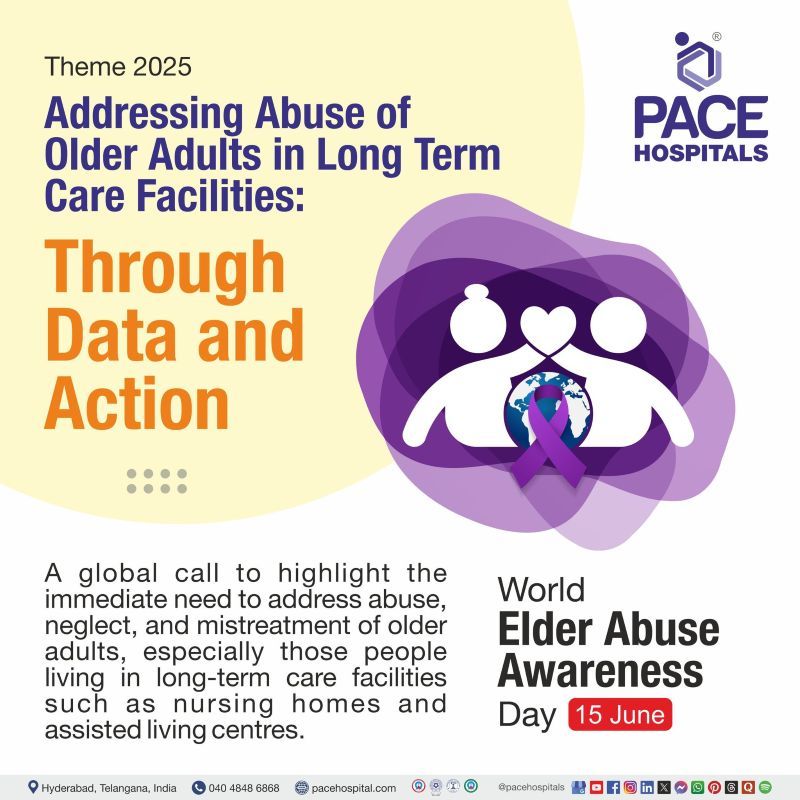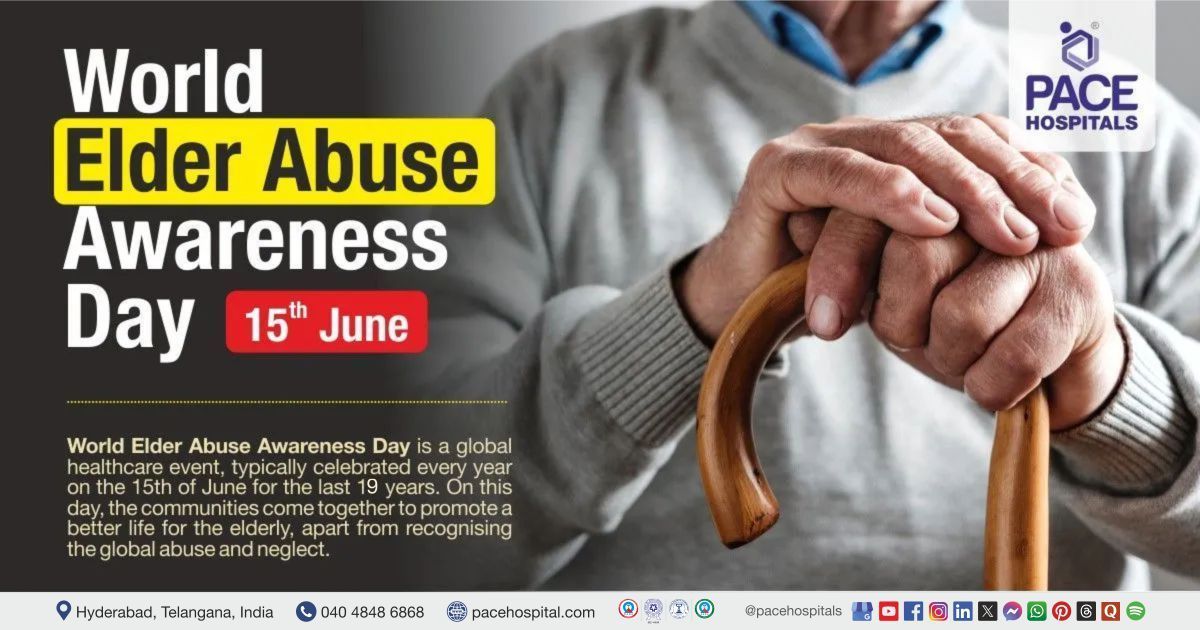World Elder Abuse Awareness Day, 15 June 2025 | Theme & History
PACE Hospitals
World Elder Abuse Awareness Day (WEAAD) is a global healthcare event, typically celebrated every year on the 15th of June for the last 19 years. On this day, various local and global communities gather around, intending to recognise the impact of global abuse and neglect facing by the elderly apart from promoting a better life by raising awareness around the cultural, economic, social, and demographic roots.
Additionally, WEAAD endorses the United Nations International Plan of Action, which recognises elder abuse as an issue of public health and human rights. WEAAD stands as a beacon of action for individuals, communities, and organisations to raise awareness of elder abuse, neglect, and exploitation.
The Types of Elderly Mistreatment
Elder abuse could be a “single or recurring act, or a lack of appropriate action, occurring within any relationship where there is an expectation of trust, causing injury or distress to an older person.” This global social issue impacts the health and human rights of older people, necessitating global attention.
There are five types of elderly mistreatment which the researchers and legal statutes recognise:
- Physical abuse - acts carried out intending for physical pain or injury.
- Psychological abuse - acts causing emotional pain or injury.
- Material exploitation - Misappropriation of the elder’s money or property.
- Neglect - Failure to meet the needs of the older person.
- Sexual assaults
The Evolution of World Elder Abuse Awareness Day
Abuse of older persons has gained increasing public attention since the 1970s insidiously. Growing interest in human rights of the elderly fuelled it.
The 16th World Congress of Gerontology, held in Australia 1997, discussed the feasibility of an international network for the prevention of elder abuse, and thus the International Network for The Prevention of Elder Abuse (INPEA) was born.
The partnership of INPEA with the World Health Organization (WHO) resulted in the approval various studies to understand the situation. Eventually, in 2006, the World Elder Abuse Awareness Day (WEAAD) was established.
It struck a chord that resonated around the globe, and both the elderly and their advocates came together—a collaboration of great minds, hearts, and people from around the world to prevent elder abuse.

World Elder Abuse Awareness Day 2025 Theme
This year 2025, the World Elder Abuse Awareness Day theme is “Addressing Abuse of Older Adults in Long Term Care Facilities: Through Data and Action”. This theme highlights the immediate need to address abuse, neglect, and mistreatment of older adults, especially those people living in long-term care facilities such as nursing homes and assisted living centers. It emphasizes the importance of using data-driven approaches to identify, understand, and act against elder abuse within these settings.
Year-by-Year, the themes for World Elder Abuse Awareness Day are:
- World Elder Abuse Awareness Day theme 2024-Spotlight on Older Persons in Emergencies.
- World Elder Abuse Awareness Day theme 2023 – Addressing Gender-Based Violence (GBV) in Older Age - Policy, Law and Evidence-based Responses
- World Elder Abuse Awareness Day theme 2022 – Combating Elder Abuse
- World Elder Abuse Awareness Day theme 2021 – Access to Justice
- World Elder Abuse Awareness Day theme 2020 – Lifting Up Voices
- World Elder Abuse Awareness Day theme 2019 – Access to Justice: Legal, Social and Economic Services for Older Victims of Sexual, Physical and Financial Crimes
- World Elder Abuse Awareness Day theme 2018 – Moving from Awareness to Action Through a Human Rights-Based Approach
The Indian perspective
Indian families tend to maintain 'togetherness' even with the ever-prevailing nuclear structure and the maintenance of emotional bonds between kith and kin. Various researchers noted the gradual increase in the life expectancy for Indians leading to a significant rise in the elderly population.
Similar to most East Asian countries, the elderly in India is greatly revered, obeyed and considered to be the fountains of knowledge and wisdom, which is why they are treated with utmost respect by family and community members alike. In various instances, the elderly care for their grandchildren, assisting the family members with household chores. Even the children continually consult them on most of the important aspects of life.
Five things to learn from India
- Indian culture challenges the Western Disengagement theory by actively involving the elderly in society, who play prominent roles in parenting and are seen as the roots of the family holding together. Active involvement benefits their self-esteem and well-being.
- The company of the elderly encourages collectivist values such as sharing, adjustment, mutual interdependence, and harmony in young children through storytelling and real-life examples from their life, thus aiding in their effective socialisation and emotional development.
- The Indian grandparents provide emotional security for young children allowing the parents to focus on their careers and personal goals. This arrangement can be beneficial for all three generations.
- The Indian success rate of marriages is higher compared to the West. Psychologists observed greater conflicts in nuclear families than in joint families. The absence of support from elderly family members in resolving conflicts is a contributing factor, leading couples to seek alternative support from counsellors and medical practitioners.
- The introduction of the National Policy for Older Persons (1999) and The Maintenance and the Welfare of Senior Citizens Act (2007) ensures the economic and emotional security of the elderly, reflecting affirmative action by the government. Similar efforts can be enacted in various other countries to protect the welfare of the elderly.
Share on
Request an appointment
Fill in the appointment form or call us instantly to book a confirmed appointment with our super specialist at 04048486868
Appointment request - health articles
Recent Articles











